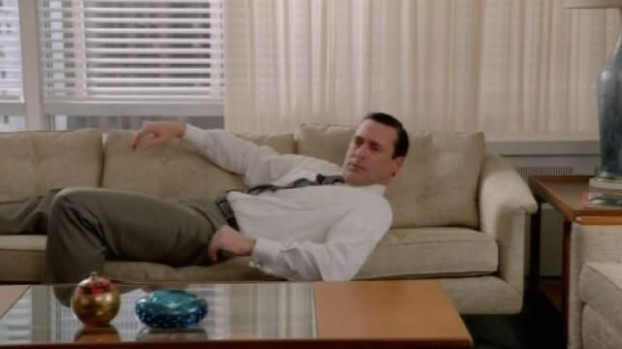 As perfect as it seemed to portray the buttoned-down, grey flannel early 60s, “Mad Men” has not been as adept at reflecting the massive social changes at the end of the decade.
As perfect as it seemed to portray the buttoned-down, grey flannel early 60s, “Mad Men” has not been as adept at reflecting the massive social changes at the end of the decade.
Betty’s visit to a hippie crash pad was kind of embarrassing. Rock and roll has kind of sidestepped Madison Avenue in this alternate universe. Vietnam and Civil Rights seem to parachute in occasionally to make a point but don’t intersect with the rest of the story.
That all changed in a single episode Sunday in an episode called “The Crash,” when pressures of the Chevy account, death, and the dissolution of Don’s affair with Sylvia combined to put Mr. Draper in one heck of a tailspin, so much so that he collapsed right on his apartment floor.
Don has been becoming something of an obsessive after his neighbor Sylvia dropped him last week; he keeps calling and standing outside her apartment smoking cigarettes; she calls to ask him to cease and desist.
The Chevy account that caused the firm’s big merge is now a big headache. They hate all of their ideas and they torture poor Ken Cosgrove whenever he goes out to Detroit. The latest escapade begins the episode, with a shocking joy ride full of drunken older executive waving guns and obscuring Ken’s vision while he drives (he ends up with a cane).
Harry Hamlin’s character orders up a Dr. Feelgood, who shoots the creative staff with some kind of unnamed stimulant that has them all up and working all weekend and even doing footraces around the office. It results in dozens of terrible ideas and Don’s own revelations on life, which seem a little scary to everyone else, particularly Peggy, who doesn’t take the drug, drinks instead, lets Stan kiss her and she considers going further, but then sees him with a fortune teller (and daughter of a dead executive?) later in the episode.
Half of what goes on in the episode is initially suspect — could it be a drug induced daydream? Don also thinks back to bad times at the old cathouse where he was raised, where one working woman nursed him out of a fever and virginity as a youth.
It reaches its scariest moment when Sally, left alone in the apartment to babysit (and reading “Rosemary’s Baby” in bed) confronts an intruder, a woman who says she helped raise Don and plays up the Nanny bit so well she cooks Sally eggs and convinces her before she goes around and steals Don’s watches. Sally calls the cop and when Don finally gets home after three days of buzzing at the office, he sees the police scene and realizes how bad things have gotten. (He faints).
That a woman is wandering around the office is weird enough and believable to make one think it was an old family story being retold by one of the writers. It helped successfully paint the late 60s as a time of potential and creative opportunity but also a time when drugs turned on you, and bad vibes came when suddenly people were ripping you off in your own house.
Nothing will likely be the same after this.